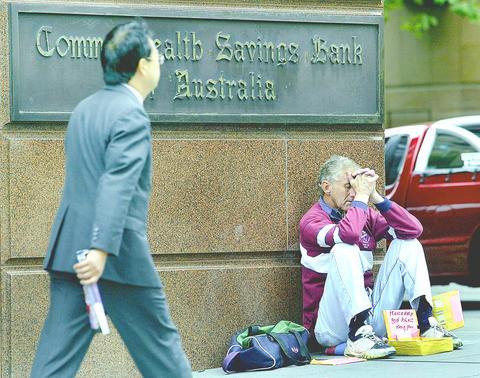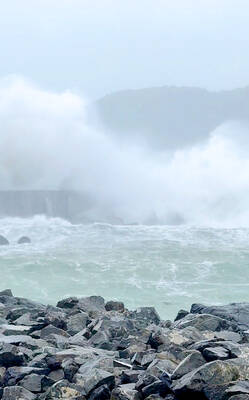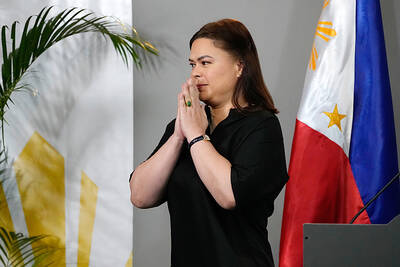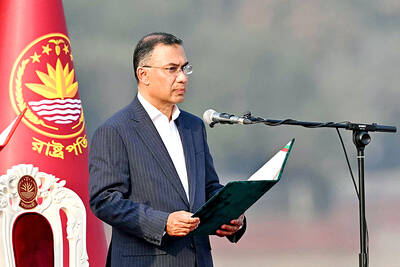A Senate report warned yesterday that the gap between Australia's rich and poor was growing dramatically, but the government has branded the study an opposition-led attempt to embarrass it in the run-up to national elections.
The bi-partisan Senate committee said that nearly 20 percent of Australians were living in poverty and too many of the country's 20 million citizens were missing out on benefits being delivered by one of the world's most buoyant economies.

PHOTO: AFP
It recommended sweeping changes to the government's strategy for tackling the problem, including redefining what constitutes poverty and establishing a federal agency which would report directly to Prime Minister John Howard.
The committee also said the minimum wage should be raised and schools should be given more money to provide breakfast to disadvantaged children who arrive at school hungry.
The report, titled "A Hand Up Not a Hand Out," was the result of a 12-month survey of departments and agencies nationwide that found 700,000 Australian children living in homes where they had never experienced anyone working.
The committee concluded that poverty was on the rise, increasing from 11.3 percent of the population in 1990 to 13 percent in 2000 and estimates of up to 4.1 million Australians now living below the poverty line.
It said 3.6 million people lived in households with incomes of less than US$300 a week, and 100,000 people were homeless, many of them children.
Committee chairman Steve Hutchins of the opposition Labor Party challenged the conservative Howard government to do "the right thing" and act on the recommendations.
"The report is on the table; it is not pie in the sky but a serious document which is based upon the input of real people," Hutchins said.
"I ask the government -- I challenge them -- to make Australia what it should be: the land of the `fair go' (equal opportunity)."
But the government's own members of the committee distanced themselves from what they said was a politically motivated report designed to throw a negative light on Howard's government ahead of an election expected around November.
"It's more about politics than addressing poverty," said Community Services Minister Kay Patterson.
Government committee member Sue Knowles said the report didn't take the poverty issue forward while Howard said the poor were better off thanks to his policies.
He immediately ruled out setting up a national body to tackle the problem.
"I don't think the answer to these issues is to have more bureaucracy," Howard said.
"I think the answer to these issues is to continually improve benefits, to provide safety nets for low income people.
"It is fair to say the rich have got richer but the poor have not got poorer. The low levels of unemployment that Australia is now enjoying means that more people have work."
The New South Wales Council of Social Service said the report was the first in 30 years to comprehensively assess the level and nature of poverty in Australia.

Heavy rain and strong winds yesterday disrupted flights, trains and ferries, forcing the closure of roads across large parts of New Zealand’s North Island, while snapping power links to tens of thousands. Domestic media reported a few flights had resumed operating by afternoon from the airport in Wellington, the capital, although cancelations were still widespread after airport authorities said most morning flights were disrupted. Air New Zealand said it hoped to resume services when conditions ease later yesterday, after it paused operations at Wellington, Napier and Palmerston North airports. Online images showed flooded semi-rural neighborhoods, inundated homes, trees fallen on vehicles and collapsed

‘COST OF DEFECTION’: Duterte’s announcement could be an effort to keep allies in line with the promise of a return to power amid political uncertainty, an analyst said Philippine Vice President Sara Duterte yesterday announced she would run for president of the Southeast Asian nation of 116 million in 2028. Duterte, who is embroiled in a bitter feud with Philippine President Ferdinand Marcos Jr, was impeached last year only to see the country’s Supreme Court throw the case out over procedural issues. Her announcement comes just days before her father, former Philippine president Rodrigo Duterte, begins a pretrial hearing at the International Criminal Court (ICC) in the Netherlands over crimes against humanity allegedly committed as part of a brutal crackdown on drugs. “I offer my life, my strength and my future

NOT YET THERE: While the show was impressive, it failed to demonstrate their ability to move in unstructured environments, such as a factory floor, an expert said Dancing humanoid robots on Monday took center stage during the annual China Media Group’s Spring Festival Gala, China’s most-watched official television broadcast. They lunged and backflipped (landing on their knees), they spun around and jumped. Not one fell over. The display was impressive, but if robots can now dance and perform martial arts, what else can they do? Experts have mixed opinions, with some saying the robots had limitations and that the display should be viewed through a lens of state propaganda. Developed by several Chinese robotics firms, the robots performed a range of intricate stunts, including martial arts, comedy sketches and choreographed

POST-UPRISING: Bangladesh Nationalist Party lawmakers were yesterday expected to formally elect Tarique Rahman as their leader and new head of government Bangladesh’s prime minister-to-be Tarique Rahman and lawmakers were yesterday sworn into parliament, becoming the first elected representatives since a deadly 2024 uprising. Rahman is set to take over from an interim government that has steered the country of 170 million people for 18 months since the autocratic government of Sheikh Hasina was overthrown. The lawmakers, who promised loyalty to Bangladesh, were sworn in by Chief Election Commissioner AMM Nasir Uddin. Bangladesh Nationalist Party (BNP) lawmakers are expected to formally elect Rahman as their leader, with President Mohammed Shahabuddin then to administer the oath of office to the prime minister and his ministers